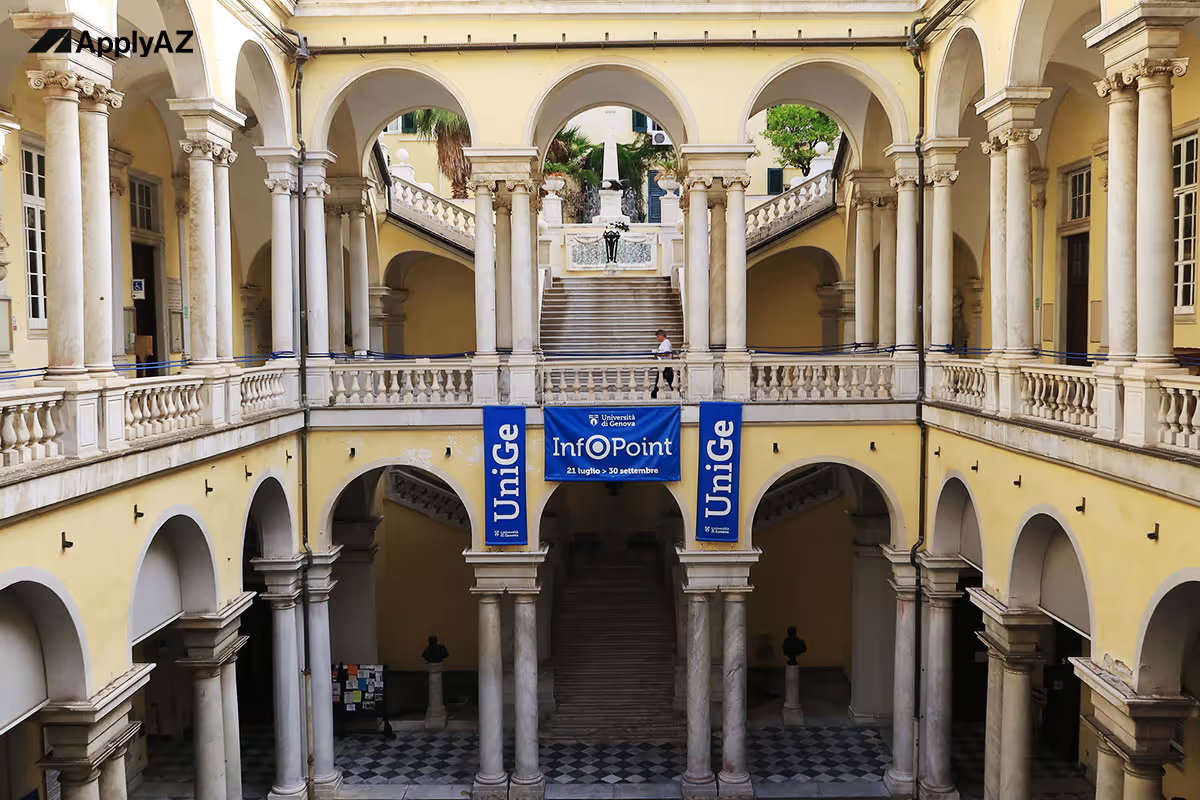Heading
Heading








University of Genoa
English‑taught programmes in Italy: why choose the University of Genoa
Founded in 1481 and consistently ranked among Europe’s leading maritime and engineering hubs, the University of Genoa offers more than 40 degree tracks taught partly or fully in English. This makes it one of the most versatile options for students seeking English‑taught programs in Italy while paying the regulated fees of public Italian universities. Incomes under specific thresholds can unlock the DSU grant, bringing total costs close to the levels often associated with tuition‑free universities Italy commentators mention. Key departments include naval architecture, robotics, computer science, biotechnology, and economics—each anchored by research centres that attract EU Horizon funding and private‑sector contracts.
Living and learning in a historic port city
Genoa stretches between mountains and sea, giving students a mild climate—winter averages 10 °C and summers hover around 28 °C. Shared flats in neighbourhoods like San Fruttuoso or Albaro cost roughly €300–€350 per month, and a €25 student travel pass covers buses, funiculars, and seaside trains. Cafeteria meals drop to €4 or even zero when the DSU grant applies. Cultural life blends Renaissance palaces, street‑art lanes, and open‑air concerts on the harbour. University sports clubs organise sailing, climbing, and coastal hikes, while language‑exchange cafés help you practise Italian after lectures.
Careers, internships, and industry links
Genoa is Europe’s busiest Mediterranean port and the core of Italy’s “Blue Economy.” Maritime giants, shipyards, and logistics groups recruit engineering and business students for roles in vessel design, supply‑chain analytics, and environmental compliance. The city also hosts the Italian Institute of Technology, famous for humanoid robots and smart materials—ideal for internships in AI, neuroscience, or nanotech. Biomedical start‑ups cluster around the university hospital, offering traineeships in gene therapy and medical imaging. Tourism and yachting sectors create seasonal part‑time jobs, useful for earning while studying. Career Services run bilingual CV workshops and link graduates to Erasmus+ traineeships across the EU.
Funding and academic support
Tuition scales from about €600 to €2 500 per year, depending on family income. Scholarships for international students in Italy include merit awards for high GPAs, fee waivers for refugee status, and lab assistantships that pay hourly. The DSU grant can waive tuition entirely, provide free meals, and contribute up to €7 000 toward rent and books—renewable when you pass 30 ECTS each year. The International Student Office helps with visa paperwork, health insurance, and accommodation lists, while the Language Centre offers free Italian courses from A1 to C1.
An inviting mix of heritage and innovation
Studying in Genoa means analysing wave mechanics in class and watching cargo ships glide past medieval city walls after hours. It means prototyping underwater drones in cutting‑edge labs, then testing them in the Ligurian Sea. Most of all, it means joining a diverse student body that values both tradition and forward‑thinking research. Choose Genoa if you want the networking ease of a medium‑sized city, the research muscle of a centuries‑old university, and cost structures that remain manageable thanks to Italy’s public‑education model and the DSU grant.
Ready for this programme?
If you qualify and we still have a spot this month, we’ll reserve your place with ApplyAZ. Our team will tailor a set of best-fit majors—including this course—and handle every form and deadline for you. One upload, many applications, guaranteed offers, DSU grant support, and visa coaching: that’s the ApplyAZ promise. Start now and secure your spot before this month’s intake fills up.
Sustainable Polymer and Process Chemistry (LM‑71)
You are probably comparing several English‑taught programs in Italy and wondering which one blends deep chemistry with industry relevance, fair fees, and solid scholarships. This master’s at the University of Genoa (Università degli Studi di Genova) lets you study in Italy in English, pay the regulated tuition of public Italian universities, and still apply for DSU grant funding that can bring final costs close to figures quoted for tuition‑free universities Italy enthusiasts mention. Below you will find everything you need to know about the Sustainable Polymer and Process Chemistry LM‑71 pathway—course design, lab access, funding routes, and career doors it opens.
How this course shines among English‑taught programs in Italy
Sustainable Polymer and Process Chemistry trains scientists who can create high‑performance materials without compromising the planet. Faculty members publish in journals such as Green Chemistry and Macromolecules and lead EU projects on biodegradable packaging, bio‑based monomers, and circular‑economy process chains. Lessons interweave molecular design, catalysis, life‑cycle assessment, and pilot‑plant engineering, so you finish ready to tackle real sustainability challenges.
Key advantages:
- Integrated approach – start with monomer synthesis, learn polymerisation kinetics, then model reactor scale‑up and product end‑of‑life scenarios.
- Dual lab track – equal exposure to wet chemistry and process simulation.
- Small cohorts – fewer than 25 students per intake guarantee one‑to‑one mentoring.
- Flexible electives – tailor your journey toward biomedical polymers, renewable composites, or green solvents.
Programme structure—120 ECTS across four semesters
Semester 1: Molecular foundations
- Advanced Organic Chemistry (9 ECTS) – reaction mechanisms, stereocontrol, and chemo‑selective routes for bio‑based monomers.
- Polymer Chemistry I (6 ECTS) – chain‑growth and step‑growth kinetics, molecular‑weight distribution, and real‑time monitoring.
- Green Chemistry Principles (6 ECTS) – atom economy, energy minimisation, safer solvents, and catalytic strategies.
- Analytical Characterisation (4 ECTS) – NMR, GPC, DSC, and FT‑IR for polymer identification; weekly instrument sessions.
- Scientific Communication (5 ECTS) – concise writing, poster design, and conference presentation skills.
Semester 2: Process design and environmental metrics
- Polymer Chemistry II (9 ECTS) – controlled radical polymerisation, ring‑opening methods, and post‑polymerisation modifications.
- Chemical Reaction Engineering (6 ECTS) – reactor sizing, mass transfer, residence‑time distribution, and scale‑up hazards.
- Life‑Cycle Assessment (5 ECTS) – ISO 14040 framework, cradle‑to‑grave modelling, and impact categories.
- Computational Tools for Chemists (4 ECTS) – Python and Aspen simulations to optimise energy and yield.
- Elective A (4 ECTS) – choose Biopolymers, Photopolymerisation, or Ionic Liquids.
Semester 3: Innovation and industrial exposure
- Process Intensification and Circular Economy (8 ECTS) – mini‑reactors, flow chemistry, recycling loops, and zero‑waste thinking.
- Catalysis for Sustainable Synthesis (6 ECTS) – heterogeneous, enzymatic, and organometallic catalysts; design of experiments (DoE) in practice.
- Safety and Regulatory Affairs (4 ECTS) – REACH, GMP, and hazard analysis for polymer plants.
- Elective B (4 ECTS) – options include Biomedical Applications, Energy‑Storage Polymers, or Nanocomposites.
- Innovation Lab (6 ECTS) – six‑week sprint to prototype a sustainable material or process; mentors from industry evaluate feasibility.
Semester 4: Internship and thesis
- Professional Internship (18 ECTS) – at least 450 hours in a university lab or partnering company. Projects range from up‑scaling an enzyme‑catalysed lactide route to testing mechanical recycling of post‑consumer plastics.
- Master’s Thesis (30 ECTS) – original research defended before faculty and external examiners. Recent titles: “CO₂‑based Polycarbonates for Food Packaging,” “Dynamic Covalent Networks for Reprocessable Thermosets,” and “Machine‑Learning Prediction of Catalyst Productivity.”
Research facilities and learning resources
- Polymer Synthesis Suite – glove boxes, photoreactors, and continuous‑flow lines.
- Advanced Spectroscopy Centre – 400 MHz NMR, MALDI‑TOF, and Raman microscopes.
- Pilot Plant Hall – 50 L to 200 L reactors with real‑time calorimetry and automated feed systems.
- Thermal Analysis Lab – DSC, TGA, and DMA for transition and degradation studies.
- Computation Cluster – 2 000 CPU cores and GPUs running Gaussian, ORCA, and Aspen Plus.
- Mechanical Testing Area – tensile, impact, and rheology rigs for polymer films and fibres.
All students complete mandatory instrument‑training badges before independent access, ensuring safety and data quality.
Career routes and industry connections
Graduates secure roles as:
- Polymer development chemist in packaging, automotive, or biomedical sectors.
- Process engineer optimising continuous polymerisation lines.
- Sustainability analyst performing life‑cycle assessments for multinational firms.
- PhD researcher in green chemistry, materials science, or chemical engineering.
Industry partners—ranging from bioplastic start‑ups to multinational resin producers—offer thesis sponsorship, plant visits, and guest lectures. The course’s advisory board includes representatives from BASF, Novamont, and Versalis, helping align content with market demands.
Funding landscape: scholarships and DSU grant
Tuition
Because the programme sits inside public Italian universities, tuition follows an income‑based scale. Annual fees rarely exceed €2 500 and can be as low as €900.
DSU grant
The DSU grant may:
- Waive tuition.
- Supply canteen meals free or at €2.
- Cover accommodation costs or provide a cash contribution up to €7 000.
Maintaining 30 ECTS each year is required for renewal.
Other funding
- Merit awards – partial fee waivers for GPA ≥ 3.5/4.
- Lab assistantships – paid hourly tutoring or sample analysis.
- Erasmus+ mobility grants – fund a semester in Germany, France, or Finland for comparative polymer research.
- Industry bursaries – €3 000–€5 000 for projects on biobased monomers, additive recycling, or energy‑saving extruders.
Admissions checklist
- Bachelor’s degree in chemistry, chemical engineering, materials science, or related (180 ECTS).
- Prerequisites – organic chemistry, physical chemistry, and basic reaction‑engineering content.
- English proof – IELTS 6.5, TOEFL 90, or certified English‑medium bachelor.
- Documents – transcript, CV, passport scan, motivation letter, two referees.
- Interview – online, 20 minutes: discuss a lab project, interpret an NMR spectrum, and outline career goals.
Your skill set at graduation
- Design monomer routes from renewable feedstocks.
- Optimise polymerisation kinetics, heat management, and reactor design.
- Evaluate environmental impact through ISO life‑cycle assessment.
- Use Python or Aspen to simulate energy and mass balances.
- Communicate findings in concise English reports and conference talks.
These competencies align with Europe’s green‑deal roadmap and UN SDG 12 (responsible consumption and production).
Why this LM‑71 belongs on your shortlist
- Combines molecular creativity with industrial scale‑up and sustainability metrics.
- Entirely English‑taught inside a respected Italian research university.
- Costs remain predictable thanks to the fee model of public Italian universities and the DSU grant.
- Lab‑heavy curriculum matched to high‑end facilities—no waiting weeks for instrument time.
- Graduate network spans leading polymer producers, specialty‑chemical firms, and PhD programmes worldwide.
Ready for this programme?
If you qualify and we still have a spot this month, we’ll reserve your place with ApplyAZ. Our team will tailor a set of best-fit majors—including this course—and handle every form and deadline for you. One upload, many applications, guaranteed offers, DSU grant support, and visa coaching: that’s the ApplyAZ promise. Start now and secure your spot before this month’s intake fills up.

They Began right where you are










